- Not have resided or carried out their main activity (e.g., work, study) in the UK for more than 12 months in the three years immediately prior to the call deadline
- Be in possession of a doctorate or have at least four years full-time equivalent research experience.
- Complete a Research Proposal (max. 10 pages) as well as additional documentation included on the CfACTs webpage.
- Application submission deadline – 30 April 2021, 2330hrs GMT
Category / Fusion themes
New album of electroacoustic music by BU academic
I am delighted to share the news that an album of my electroacoustic compositions, Espaces éphémères, has recently been published and released through the long-established Canadian independent label empreintes DIGITALes.

This collection features music created before my arrival at BU, along with my 2017 composition Traces of Play. This piece, as practice-based research, aims to deepen understanding of how recurrent sound phenomena might be deployed and developed to create larger-scale musical forms and coherent sound worlds within music compositions. It has featured at international festivals and conferences in New York, Beijing, Brussels, and Montpellier, and was awarded prizes in the Klang! Electroacoustic Composition Competition (France) and the Destellos Composition Competition (Argentina).
The other works on the album have also received international performances and have similarly been awarded in international composition competitions. Audio extracts of all the compositions can be heard via the link above.
It is fantastic to have my music featured on empreintes DIGITALes, and to have my compositions published alongside renowned composers from the field of electroacoustic music.
Call for Papers: Digital Narrative and Interactive Storytelling for Public Engagement with Health and Science
Guest Editors: R. Lyle Skains and An Nguyen, Dept. of Communications & Journalism, Bournemouth University
Register your interest and submit abstracts at https://www.frontiersin.org/research-topics/17893
Keywords: digital narrative, interactive storytelling, health communication, science communication, science education, science journalism
We are seeking papers for a joint issue with Frontiers in Communication (Science and Environmental Communication; Health Communication) and Frontiers in Environmental Science (Science and Environmental Communication) on digital and interactive narratives and science and health education and journalism. This Special Topic aims to investigate how digital media affordances—such as human-machine and human-human interactivity, multimedia capacities, dynamic visual appeal, playfulness, personalization, real-time immersion, multilinear narrative, and so on—have been and can be used to effectively communicate health and science issues. We would like to go beyond the current discourse on fake news, mis/disinformation and online radicalization, which recognizes the malignant effects of digital media on health and science affairs, to refocus on the positive affordances of digital media—both in direct education (e.g., museums, public demonstrations, school settings) and through the media (e.g., news, film, games)—as communication tools and techniques for health and science topics.
The aim of this Research Topic is, therefore, to explore the current state of play, as well as potential future trajectories, of digital narrative and storytelling in the communication of health and science topics. We invite scholarly investigations, including theoretically driven and practice-related research, on any topic relevant to that overall goal. Some potential topics include, but are not limited to:
- How can science and health be effectively communicated through both playful and informative digital narrative and storytelling forms?
- How can information, education and entertainment be integrated into digital narratives about health and science issues?
- How do the socio-technical affordances of digital health and science narrative and storytelling, especially interactivity, affect audience experience, message cohesion, knowledge acquisition, emotional engagement and, ultimately, health/science literacy?
- Can digital narrative and storytelling serve as an antidote to digital health and science mis/disinformation and online science denial more broadly, and in what way?
- How are interactive narratives currently used for health & science communication and what are the social, economic and technological constraints on their production?
Types of Manuscripts:
● Empirical Research Papers
● Practice-led research Projects
● Reviews
● Conceptual Analysis
● Brief Research Reports
● Perspectives/Commentaries
Details on manuscript types: https://www.frontiersin.org/journals/communication#article-types
Abstract Deadline: 31 March 2021
Full Papers: 30 Sept 2021
The full call is at https://www.frontiersin.org/research-topics/17893; please register interest using the “Participate” button, and contact Lyle Skains (lskains@bournemouth.ac.uk) with any questions.
Congratulations to Prof. Jonathan Parker
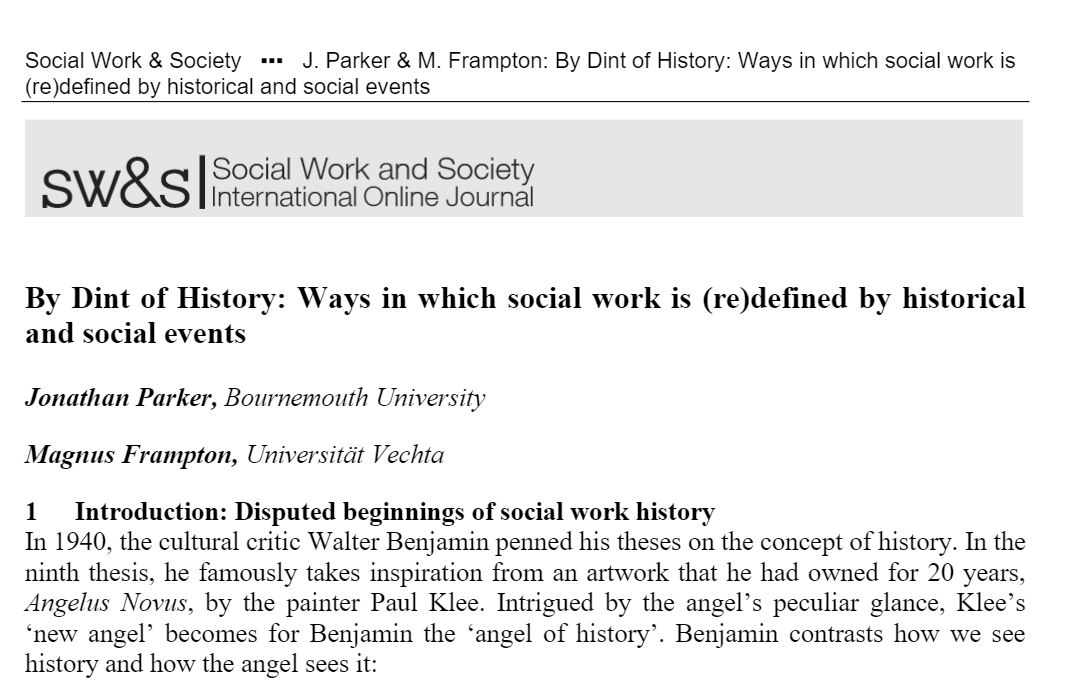 Congratulations to Professor Jonathan Parker on his latest publication ‘By Dint of History: Ways in which social work is (re)defined by historical and social events‘. This interesting paper is co-authored with Magnus Frampton from the Universität Vechta in Germany and published in the international journal Social Work & Society.
Congratulations to Professor Jonathan Parker on his latest publication ‘By Dint of History: Ways in which social work is (re)defined by historical and social events‘. This interesting paper is co-authored with Magnus Frampton from the Universität Vechta in Germany and published in the international journal Social Work & Society.
Reference:
- Parker, J., Frampton, M. (2020) By Dint of History: Ways in which social work is (re)defined by historical and social events, Social Work & Society, Volume 18, Issue 3: 1-17.
Student Entrepreneurship at Bournemouth University
The nature versus nurture debate has long dominated entrepreneurship discussions in academia. But, globally, across universities and business schools, there is increased recognition of the role of university education as a springboard for entrepreneurial action. This may be in sharp contrast to many entrepreneurs’ stories of dropping out of colleges to pursue their entrepreneurial ambitions but, the role of higher education in shaping entrepreneurship cannot be discounted. Enterprise education, as a tool, can prepare students for coping with changing environments and increase their self-efficacy.
At Bournemouth University Business School, I am privileged to lead the final year Entrepreneurship and Business Ventures, a module in the Entrepreneurship Pathway, which brings in students from 7 programmes on to this pathway- Many of whom join this as they have a latent entrepreneurial ambition; some merely for the curiosity of the subject and some naturally meander into it and find their passion. The strength of this module is in shaping the entrepreneurial dreams of many through in-class incubation support and bringing in expertise from entrepreneurs and industry stalwarts.
The highlight of this year’s culmination of this module was the Annual Entrepreneurship Elevator Pitch competition where students had to present, as individuals, a well researched, well thought out, original business idea, underpinned by the UN SDGs, all in 3 minutes to a panel of external judges. Normally, this is a grand event on campus but this year was no less exciting online. Entrepreneurship is not what you know, it is more ‘Who’ you know. The role of social capital in enterprise development cannot be overstated. lack of financial capital is often cited as a key entrepreneurial barrier but to some extent, developing social capital through engaging with mentors, peers, friends can remove some of those barriers. Supported by Mark Painter, Business Development Manager at BUBS who said, “this event provides an invaluable opportunity for students to learn from a ‘live’ business audience and gain access to their contacts and networks“.
It is also imperative that we encourage entrepreneurship to be more socially and environmentally sustainable, not just focus on the single bottom line. And this is not mere altruism, this makes business sense, it leads to increased competitive advantage. And guess who is leading the way? Our millennials! It’s change in motion through power of collaboration and information sharing by a generation remarkably conscious of their wider environment. Never before has it been more important to think of collective action, as the pandemic and the climate change crises are showing. UN SDGs, as part of the core ethos of start-ups, are becoming the norm in this rapidly changing world which makes me very excited for the future.
A couple of weeks ago, in front of a live online panel of entrepreneurs, our final year Entrepreneurship Pathway students demonstrated their commitment to creating an equitable world, through the power of responsible capitalism and enterprise building, underpinned by actions to achieve the UN SDGs. This year we had Anthony Woodhouse, Executive Chairman of Hall & Woodhouse Pub and Brewery; Olly Whittle CEO of Swarm Social; Jon Thor Sigurleifsson, Content Marketer; and Kevin Whitehouse , Founder of Prime Entry Accountants.
Anthony Woodhouse, Executive Chairman Hall& Woodhouse said, “Really enjoyed the day – many inspirational ideas and great fun. I and the team at H&W look forward to working with the winners on their free day of consultancy provided by us trying to help them on their journey of turning their ideas into reality.” The participation of the panel of judges is the continuation of ‘Meet the Entrepreneurs’ series that we run through the course of this module to allow our aspiring student entrepreneurs to build meaningful networks and relationships. It is also an opportunity to “spot future business ideas“, as Olly Whittle notes.
Each year, we have huge amounts of support from entrepreneurs, business organisations and individuals in helping our students fulfil their entrepreneurial dreams and it is with great sadness we bid final adieu to our mentor, friend, a true example of a global entrepreneur, Damien Lee, who has worked with us closely over a number of years supporting student entrepreneurship at BU. Each year our students have learned greatly from his success story, a story of entrepreneurial resilience, perseverance in the face of adversity and indomitable spirit and who can forget him turning up at our 2019-20 Elevator Pitch event armed with boxes and boxes of Mr. Lee’s Noodles for all our students and guests!
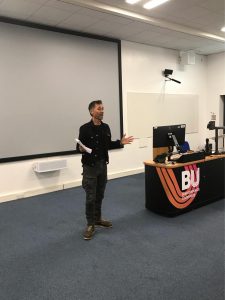
Damien Lee, Founder of Mr. Lees Noodles.

We continue our success story of encouraging student entrepreneurship at Bournemouth University, recognising it as a part of the great reset post Covid, and this is aptly captured in the words of our panelist Jon Thor Sigurleifsson, ”
“Having been part of BU’s pitch event a couple of times now I’ve gotta say there must be something in the water over there! I always walk away feeling inspired and hopeful for the future when I see all the great ideas that come up from the students.
Another reason why I love taking part in this exercise is that I know how valuable it is to get real life insights into the world of startups and entrepreneurship from those who have experienced it themselves. Some of the most common pieces of feedback given are things that, if applied, can change the course of these students’ journeys forever without having to learn them the hard way. There are enough challenges out there without having to go in completely blind.
So huge shout out to everyone responsible for this at BU, you’re going above and beyond in order to give your students the best possible chance at success.I can’t wait to speak to some of this year’s students and offer up my advice and mentorship in order to help them dive into their respective ventures.”
I wish all the Entrepreneurship Pathway students success in their future endeavours and huge congratulations to all the winners.
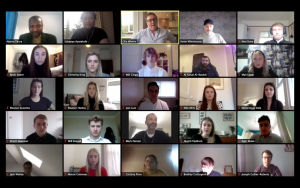
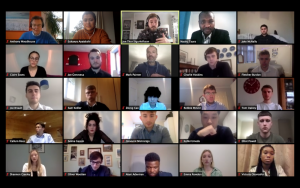
Asian Elephant Acoustic Monitoring
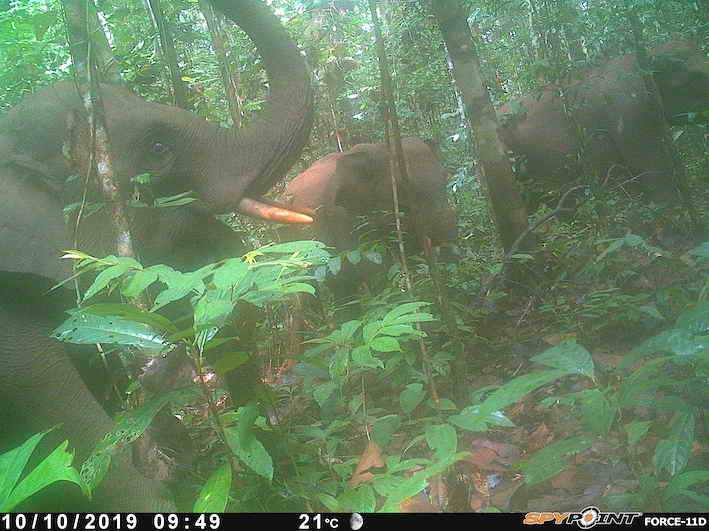
Wild Sumatran Elephant recorded on BU trail camera. Project by BU PhD student Helen Slater (Pippa Gillingham & Amanda Korstjens), in collaboration with Invisible Flock.
Elephants live in complex societies with a rich array of social interactions and a sophisticated communication system that includes extensive use of audible and infra sounds. Eavesdropping on their long and short-range vocal communication may be a way to help us monitor wellbeing for captive elephants, understand population sizes of wild elephants and even help us monitor the movements of wild elephants approaching human settlements and fields. Our multi-disciplinary team is interested in developing the tools and methods for passive acoustic monitoring of elephants for a range of applications as part of a new collaboration including researchers, technologists, conservationists and artists.
We are looking for an enthusiastic, independent, MRes student to join us to study acoustic communication and behaviour of captive Asian elephants, Elephas maximus. The aim of this one-year research project is to identify whether passive acoustic monitoring can play a role in monitoring captive elephant wellbeing and activity. The project involves studying behaviour and vocalisations of the Asian elephant herd at Whipsnade zoo, Zoological Society London. Preferred course start April 2021 – other options can be discussed.
Project page: https://go-leap.wixsite.com/home/elephantacoustics
We are also happy to discuss a longer-term project at the level of a self-funded MPhil or PhD.
Supervisors
Amanda Korstjens, akorstjens @ bournemouth.ac.uk
Kathy Hodder, khodder @ bournemouth.ac.uk
Lewis Rowden, at ZSL
Alasdair Davies, Arribada at ZSL
Full research team:
Victoria Pratt and Ben Eaton from Invisible Flock
Tom Davis, Bournemouth University
MRes course at Bournemouth University
Doing an MRes degree at Bournemouth University allows you to focus on research, which you write up as a thesis, without completing coursework, although you will also have the benefit of a small number of mandatory skills workshops.
At the start of the project, you will discuss your development goals and requirements with your supervisory team, and we will provide you with relevant training opportunities. This project offers the opportunity to learn skills in animal behaviour data collection and analyses with experts in the field. You will also have the opportunity to learn more about developing low-cost acoustic devices, collecting and analysing sound recordings, and can join in public engagement activities.
You will become a member of the Bournemouth University Postgraduate Researcher group (PhD, MPhil and MRes students), where you fall under the support from our doctoral college. At the university you are part of the Life and Environmental Sciences Department where we have an inclusive welcoming team of scientists working on a wide breadth of research in biological and ecological subjects (LES).
Start Date: April 2021 (preferably)
Contact: please contact Amanda Korstjens if you have any questions about this opportunity. akorstjens @ bournemouth.ac.uk (without the spaces)
Some further information on the work we do:
Elephant research at Bournemouth University: https://www.bournemouth.ac.uk/research/research-action/sumatran-elephant-conservation ZSL Research: https://www.zsl.org/science/research
Arribada Initiative: https://arribada.org/
Invisible Flock: Inaudible Science-art collaboration: https://invisibleflock.com/portfolio/inaudible/
You will become a member of the LEAP research group, you can find completed MRes and PhD theses of the LEAP team here: https://go-leap.wixsite.com/home/publications
Details on the MRes scheme and links to how to Apply can be found here:
https://www.bournemouth.ac.uk/study/courses/master-research-faculty-science-technology-1
Application page link (please check the general course information pages first).
Funding:
We will provide equipment.
We cannot fund accommodation, fees or stipend.
We will support and train you in preparing external funding bids.

Sumatran Elephant by @AHKorstjens
NIHR Grant Applications Seminar ONLINE- 23rd March 2021


Dear colleagues
– Do you have a great idea for research in health, social care or public health?
– Are you planning to submit a grant application to NIHR?
Our popular seminar continues online and will take place on Tuesday 23rd March 2021 from 10.00am – 12.30pm.
The seminar provides an overview of NIHR funding opportunities and research programme remits, requirements and application processes. We will give you top tips for your application and answer specific questions with experienced RDS South West advisers.
We also have a limited number of 20-minute 1-to-1 appointments available after the seminar should you wish to discuss your proposed study with an RDS adviser.
Find out more and book a place.
Your local branch of the NIHR RDS (Research Design Service) is based within the BU Clinical Research Unit (BUCRU)
We can help with your application. We advise on all aspects of developing an application and can review application drafts as well as put them to a mock funding panel (run by RDS South West) known as Project Review Committee, which is a fantastic opportunity for researchers to obtain a critical review of a proposed grant application before this is sent to a funding body.
Contact us as early as possible to benefit fully from the advice
Feel free to call us on 01202 961939 or send us an email.
IMSET Seminar: Exploring the chaîne opératoire of applied long-term human ecodynamics
 Thursday 21st January 4pm – 6pm
Thursday 21st January 4pm – 6pm
Exploring the chaîne opératoire of applied long-term human ecodynamics: examples from the human paleocology of Subarctic and Arctic seas.
Book your place in the seminar with Professor Ben Fitzhugh, Department of Anthropology, University of Washington.
Professor Fitzhugh’s research focuses on human-environmental dynamics and archaeological histories of maritime/coastal hunter-gatherers especially in the North Pacific. His research addresses questions of human vulnerability and resilience in remote subarctic environments.
Researchers studying long-term human ecological histories increasingly promote the relevance of this work to contemporary environmental managers, policy makers, and heritage communities. After all, our case studies and comparative insights capture greater ranges of socio-environmental variation and longer temporal sequences than are available to planners tethered to the short observation scales. These longer time-lines and more varied “completed experiments of the past” make it possible to track dynamic relationships and downstream legacies driving more and less sustainable strategies and relationships. This information should help us to avoid the mistakes of the past and to build policy on robust understandings about the capacities of systems for stability and change. Nevertheless, meaningful engagement remains limited. If we are serious about this effort, we owe it to ourselves to examine the practical challenges and paths to solutions to implementation of applied long-term human ecodynamics. For this talk, Professor Fitzhugh will expand on the need for a “chaîne opératoire of applied long-term human ecodynamics.” Chaîne opératoires are the inferred technical steps perceived to govern the production, use and discard of technological objects like stone tools, and his argument here is that we could stand to investigate the impediments and limitations of practice that keep academic work at arms length from management policy. Using climate, marine ecological and archaeological case studies from the subarctic North Pacific, he will explore key steps involved in forming and bringing compelling human ecodynamic scenarios of the past into dialogue with contemporary management science and policy. These steps involve managing data uncertainties, unequal resolutions and relevance, disparate interpretive constructs, and epistemic and ontological asymmetries.
Professor Fitzhugh is currently Director of the Quaternary Research Center at the University of Washington, and in this role, seeks to promote interdisciplinary scholarship in the evolution of the earth surface (and the role of humans in it) over the past two and a half millions years.
https://anthropology.washington.edu/people/ben-fitzhugh
Professor Fitzhugh will speak for approximately 1 hour, followed by Q&A.
Book a place at this seminar via eventbrite.
Launch Event – The Centre for Applied Creative Technologies (CfACTs)
Thursday 21st January 2021 – 09.00 (Via Zoom)
There is still time to register. Join us for the launch of CfACTs the new BU Post Doctorate Training Centre.
Professor Jian Chang is pleased to inform you about six funded Post Doctorate Research Fellowships via the Centre for Applied Creative Technologies (CfACTs) at Bournemouth University UK. CfACTs is co-funded by H2020 MSCA COFUND, Bournemouth University and Industry Partners; please see: https://cordis.europa.eu/project/id/900025.
CfACTs, led by Prof Jian Chang and Prof Jian Jun Zhang at Bournemouth University, is recruiting international Post-Doctoral Researchers Fellows (1st cohort starting May 2021) to work on Creative Technology R&D with UK Industry Partners. The candidates will need to apply through a selective process, where they are welcome to propose a research proposal on related themes.
Professor Jian Chang would like to invite you to attend the virtual launch event for CfACTs which will be 9:00am (GMT) 21/01/2021, via Zoom. The aim of the event is to provide information about the CfACTs fellowships and encourage the international academic community to promote the centre to applicants.
Please, if you have not already done so, register to attend the event and feel free to distribute the news by kindly forwarding the invitation to peers/colleagues to join the launch event.
For further information regarding this event please contact:
cfacts-enquiries@bournemouth.ac.uk
or
Prof Jian Chang, CfACTs Director JChang@bournemouth.ac.uk
Help us build our social medial following; Follow us on Twitter @CfACTs_BU
Net Zero
The Think Tank Onward have published its latest research report, Getting to zero, which marks the launch of a major cross-party programme of research to understand the political and practical challenges to achieving net zero by 2050, and to develop policies to help people and places who may be disrupted in the transition.
You can read the full report here.
Summary below provided by Dods.
Getting to zero will be jointly chaired by Rt Hon Caroline Flint, who served as Shadow Energy and Climate Change Secretary for 4 years, and Dame Caroline Spelman, who was Environment Secretary for 2 years and negotiated the Sustainable Development Goals for the UK at Rio 2012. The wider steering group includes Melanie Onn, former Labour MP for Great Grimsby and Deputy CEO of Renewables UK, Ruth Edwards, MP for Rushcliffe, and Guy Newey, Energy Systems Catapult. A full list is included below.
The launch report for the programme, published today, argues that the UK has led the world in delivering net zero in recent years:
- The UK was the first major economy to legislate for Net Zero emissions by 2050, prompting China, Japan, France and South Korea to follow suit. With the USA expected to join the club in 2021, more than three fifths (62%) of global CO2 emissions, and three quarters (74%) of global GDP, will shortly be subject to legally binding net zero targets.
- The UK’s manufacturing, industrial, heat and electricity sectors have all decarbonised by around half since 1990, the highest rates in the G7. Over the same period, China and India have seen their manufacturing and industrial emissions grow by 370% and 280% respectively and China’s emissions from heat and electricity have risen 540%.
But as the UK goes further and faster to delivering net zero there will increasingly be geographic, political and economic trade offs that need to be better understood and mitigated. Looking at the distribution of jobs in industries that contribute more than 2% of UK carbon emissions, Onward finds:
- The UK’s least prosperous regions disproportionately rely on heavily emitting industries for jobs at present. The East Midlands has the highest proportion of jobs in high emitting industries (42%), closely followed by the West Midlands (41%), Yorkshire and the Humber (38%), and the North West (38%). In contrast, London and the South East have the lowest proportion of jobs in high emitting industries, with 23% and 34% respectively. In total, more than half (52%) of high emitting jobs are located in the North, Midlands (19%) and Scotland (9%).
- Politically, there is a strong correlation between the political battlegrounds of recent elections, and the areas with the most high emitting jobs. Of the top tenth of constituencies by high emitting jobs, 14% are in Scotland, 28% are in the North and 22% are in the Midlands, but just 5% are in London. In the reverse, over half (52%) of the lowest tenth of constituencies by high-emitting jobs are in London. Just 5% are in the Midlands.
- The seats that make up the so-called Red Wall in the North and the Midlands, which were targeted at the last election and which will form the key battleground at the next election, are likely to suffer the highest levels of disruption of any constituencies. 43% of workers in the Red Wall work in currently high-emitting industries, compared to an average of 37% for Conservative and Labour seats outside the Red Wall. Liberal Democrat seats have the lowest proportion of high emitting jobs – just 32% on average.
- The more rural a constituency is, the more its local economy relies on high emitting jobs. Nearly half (48%) of the top decile of constituencies by high emitting jobs are classified as rural or towns, while just a quarter (25%) are in cities. In contrast, more than half (54%) of the seats least reliant on high emitting jobs are in cities, 44% are in towns and only 2% are rural.
The research will spend the next nine months ahead of COP26 looking at three aspects of the net zero transition: how to decarbonise incumbent industries; how to retrain and upskill workers at risk of disruption; and how to create the regulatory and financial conditions for innovation. It will use statistical research, polling and focus groups and engage a wide range of Whitehall departments, industries and campaigners.
Ted Christie-Miller, author of the report:
“Net zero will require more than legal commitments. It demands a plan that is not only practical but which smooths the transition for those people and places whose livelihoods are based in the carbon economy, many of whom are in the Red Wall battlegrounds that decided the last election and may well decide the next.”
“The UK has an historic opportunity in advance of COP26 next year to develop lasting policies that can not only deliver net zero but which can carry the support of voters and companies through a titanic transformation of our economy and society. It must take it.”
Dame Caroline Spelman, Co-chair of the Getting to zero commission:
“Reducing carbon consumption to net zero is the socially responsible decision our generation has taken to help future generations; but we must make sure the impact of this does not aggravate existing inequalities in our country. This can only be done by enabling mitigation for those who will be hardest hit and taking advantage of the opportunities that are there to be grasped.”
Rt Hon Caroline Flint, Co-chair of the Getting to zero commission:
“The challenge of net zero is immense; the deadlines are rushing towards us. This requires faster decision making than we are used to in British politics, as we change our industries, our homes, how we get from place to place and the very energy we use. In cleaning up our act, no community should be left behind. They will all have to be part of the journey and share the benefits. I look forward to working with Dame Caroline Spelman and the wide range of contributors to the Getting to zero project.”
Midwifery and the Media
Today we received an end-of-year good-news message from ResearchGate telling us that 700 people had ‘read’ our book Midwifery, Childbirth and the Media [1]. 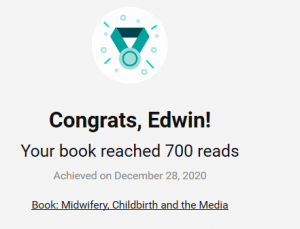 Lee Wright, Senior Lecturer in the School of Nursing and Midwifery at Birmingham City University wrote in his review of our edited volume: “…our media image and digital foot print are rapidly becoming the most important window into our profession. In a rapidly changing environment this book provides an up to date and informative insight into how our profession is affected by the media and how our profession can inform and influence the image of midwifery. This area is going to become even more important in the future universities and trusts increasingly use broadcast and social media to manage information and inform our clients of the services we provide. This book will be the important first text in a new growth area. It brings together an internationally recognised group of authors who are experts in this field. I wholeheartedly recommend it to you.”
Lee Wright, Senior Lecturer in the School of Nursing and Midwifery at Birmingham City University wrote in his review of our edited volume: “…our media image and digital foot print are rapidly becoming the most important window into our profession. In a rapidly changing environment this book provides an up to date and informative insight into how our profession is affected by the media and how our profession can inform and influence the image of midwifery. This area is going to become even more important in the future universities and trusts increasingly use broadcast and social media to manage information and inform our clients of the services we provide. This book will be the important first text in a new growth area. It brings together an internationally recognised group of authors who are experts in this field. I wholeheartedly recommend it to you.”
This edited collection was published by Palgrave Macmillan in 2017 and it is part of a larger body of Bournemouth University research on the topic [2-6].
Professor Edwin van Teijlingen, Professor Vanora Hundley and Associate Professor Ann Luce
References:
- Luce, A., Hundley, V., van Teijlingen, E. (Eds.) (2017) Midwifery, Childbirth and the Media, London: Palgrave Macmillan [ISBN: 978-3-319-63512-5].
- Luce, A., Cash, M., Hundley, V., Cheyne, H., van Teijlingen, E., Angell, C. (2016) “Is it realistic?” the portrayal of pregnancy and childbirth in the media BMC Pregnancy & Childbirth 16: 40 http://bmcpregnancychildbirth.biomedcentral.com/articles/10.1186/s12884-016-0827-x
- Angell, C. (2017) An Everyday Trauma: How the Media Portrays Infant Feeding, In: Luce, A. et al. (Eds.) Midwifery, Childbirth and the Media, London: Palgrave Macmillan pp: 45-59.
- Hundley, V., Luce, A., van Teijlingen, E., Edlund, S. (2019) Changing the narrative around childbirth: whose responsibility is it? Evidence-based Midwifery 17(2): 47-52.
- Hundley, V., Duff, E., Dewberry, J., Luce, A., van Teijlingen, E. (2014) Fear in childbirth: are the media responsible? MIDIRS Midwifery Digest 24(4): 444-447.
- Hundley, V., Luce, A., van Teijlingen, E. (2015) Do midwives need to be more media savvy? MIDIRS Midwifery Digest 25(1):5-10.
New interdisciplinary COVID-19 paper
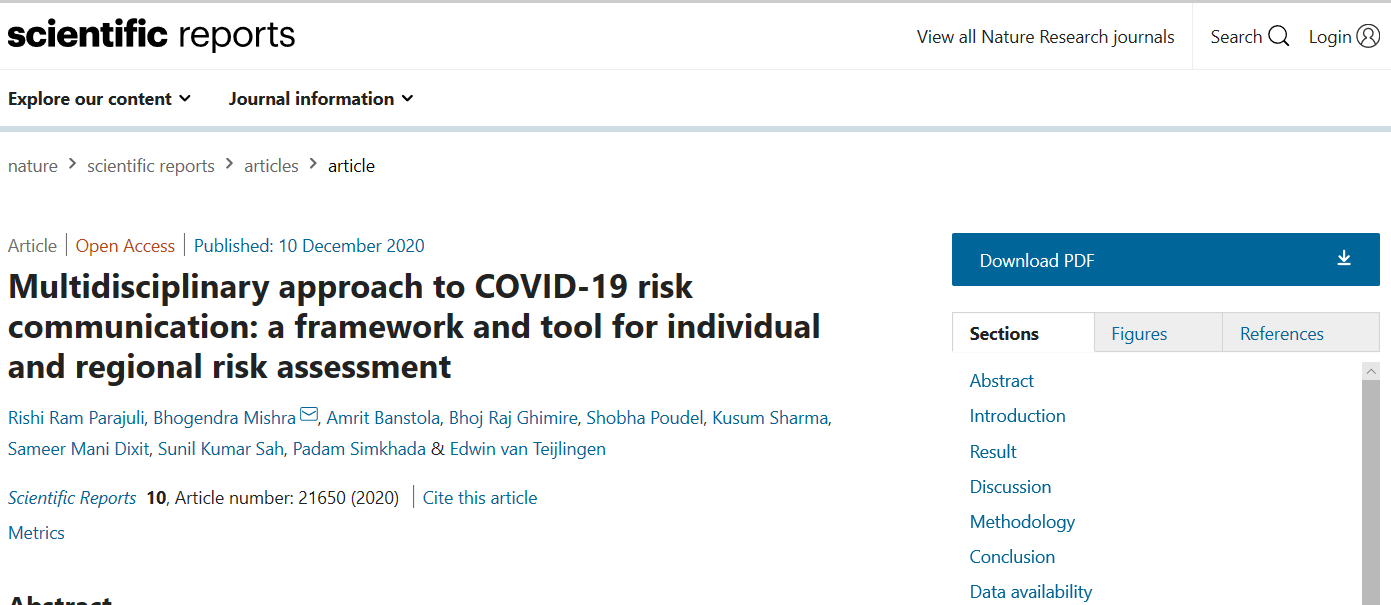 An evidence-based, multidisciplinary approach on risk zoning, personal and transmission risk assessment in near real-time, and risk communication would support the optimized decisions to minimize the impact of coronavirus on our lives. This interdisciplinary paper [1], pubished today in Scientific Reports, offers a framework to assess the individual and regional risk of COVID-19 along with risk communication tools and mechanisms. Relative risk scores on a scale of 100 represent the integrated risk of influential factors. The personal risk model incorporates age, exposure history, symptoms, local risk and existing health condition, whereas regional risk is computed through the actual cases of COVID-19, public health risk factors, socioeconomic condition of the region, and immigration statistics. A web application tool (http://www.covira.info) has been developed, where anyone can assess their risk and find the guided information links primarily for Nepal. This study provides regional risk for Nepal, but the framework is scalable across the world.
An evidence-based, multidisciplinary approach on risk zoning, personal and transmission risk assessment in near real-time, and risk communication would support the optimized decisions to minimize the impact of coronavirus on our lives. This interdisciplinary paper [1], pubished today in Scientific Reports, offers a framework to assess the individual and regional risk of COVID-19 along with risk communication tools and mechanisms. Relative risk scores on a scale of 100 represent the integrated risk of influential factors. The personal risk model incorporates age, exposure history, symptoms, local risk and existing health condition, whereas regional risk is computed through the actual cases of COVID-19, public health risk factors, socioeconomic condition of the region, and immigration statistics. A web application tool (http://www.covira.info) has been developed, where anyone can assess their risk and find the guided information links primarily for Nepal. This study provides regional risk for Nepal, but the framework is scalable across the world.
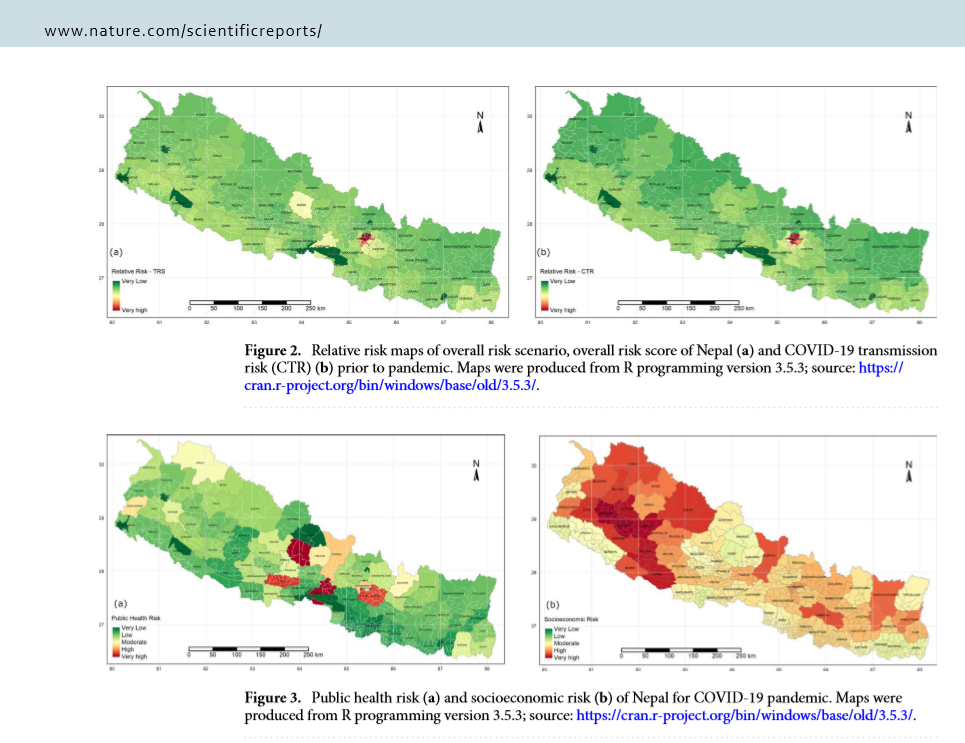 The authors comprised researchers from the University of Bristol, Science Hub (Nepal), University of the West of England, Public Health Perspective Nepal, Nepal Open University, Center for Molecular Dynamics Nepal, Mid Yorkshire Hospitals NHS Trust, the University of Huddersfield and Bournemouth University.
The authors comprised researchers from the University of Bristol, Science Hub (Nepal), University of the West of England, Public Health Perspective Nepal, Nepal Open University, Center for Molecular Dynamics Nepal, Mid Yorkshire Hospitals NHS Trust, the University of Huddersfield and Bournemouth University.
Reference:
- Parajuli, R.R., Mishra, B., Banstola, A. Multidisciplinary approach to COVID-19 risk communication: a framework and tool for individual and regional risk assessment. 21650 (2020). https://doi.org/10.1038/s41598-020-78779-0
HE Policy Update for the w/e 10th December 2020
We’re awash with experimental statistics this week! So far it looks as though Covid hasn’t resulted in mass (early) drop outs. There’s more detail on the Lifetime Skills Guarantee and the Education committee has been grilling the Minister on exams.
Sustainability
The Higher Education Policy Institute (HEPI) has published a report Beyond business as usual: Higher education in the era of climate change
The paper describes how four areas of activity for universities:
- Redesigning the day-to-day operations of universities and colleges to reduce emissions, nurture biodiversity and adapt to the impacts of a changing climate;
- Reinvigorating the civic role of institutions to build ecologically and socially resilient communities;
- Reshaping the knowledge structures of the university to address the interdisciplinary complexity of climate change;
- Refocusing the educational mission of the institution to support students to develop the emotional, intellectual and practical capacities to live well with each other and with the planet in the era of climate change
And the paper recommends that universities and colleges should:
- reconfigure their day-to-day operations to achieve urgent, substantial and monitored climate change mitigation and biodiversity enhancement action in accordance with Paris climate commitments and the Aichi biodiversity targets.
- develop a clear operational plan for implementing climate change adaptation measures developed in partnership with local communities.
- develop an endowment, investment and procurement plan oriented towards ecological and economic sustainability.
- develop a civic engagement strategy that identifies how to build stronger partnerships to create sustainable futures.
- explore how they can rebalance their educational offerings to support older adults transitioning away from high-carbon forms of work.
- examine the institutional barriers – historic, organisational, cultural – to building dialogue across disciplines and with knowledge traditions outside the university and establish the institutional structures and practices needed to address these barriers.
- initiate an institution-wide process to bring together staff and students to develop programmes that are adequate to the emotional, intellectual and practical realities of living well with each other and with the planet in the era of climate change.
Three proposals are made for nationwide interventions that will actively support the proposals above:
- The Business, Energy and Industrial Strategy Research Roadmap (in partnership with devolved administrations) should establish a ‘moonshot’ research programme oriented to ensuring that all university and college operations in the UK (including academic and student travel) have zero carbon emissions by 2035, with a 75 per cent reduction by 2030; www.hepi.ac.uk 11
- A £3 billion New Green Livelihoods programme should be established to support educational activities that will enable debt-free mass transition of older adults from carbon-intensive employment towards creative sustainable livelihoods;
- The year 2022 should be designated a year of ‘Sustainable Social Innovation’ involving a programme of mass public education, in partnership between the BBC, universities and colleges and the Department for Business, Energy and Industrial Strategy; this should engage over two million people in collective learning for the changing conditions of the climate change era.
Research Professional cover the story:
- The Higher Education Statistics Agency publishes climate data and, as we covered earlier this year, there has been a steady reduction in university-created carbon emissions since 2017-18—although more than 20 higher education institutions have recorded an increase during that time (they are listed here, if you’re curious).
- The People and Planet campaign group, which somewhat glibly ranks universities by how green they are, has also put pressure on universities—particularly with its work on fossil fuel divestment and its criticism of the recently announced (and no doubt well-intentioned) Climate Commission for UK Higher and Further Education Leaders.
Research
Innovation Catapults
The Lords Science and Technology Committee ran two sessions into their inquiry on The contribution of Innovation Catapults to delivering the R&D Roadmap. The second session also covered the performance of the Catapult network in the context of various performance reviews and how Catapults might evolve going forward. Dods have summarised the key discussions from the two sessions here.
Research Repository
Dods report that Jisc have launched
- a new multi-content repository for storing research data and articles that will make it easier for university staff to manage the administration around open access publishing.
- …it will allow institutions to meet all Plan S mandatory requirements and other funder and publisher mandates for open scholarship.
- Developed with input from the research sector, the research repository allows institutions to manage open access articles, research data and theses in a single system.
- The research repository is a fully managed ‘software-as-a-service’ provision, which is hosted on a secure cloud platform. Included in the service is an in-built ‘FAIR checker’ to make sure research data is ‘findable, accessible, interoperable and reusable’.
- Jisc also offers research systems connect, a preservation service and research repository plus: a single service to manage, store, preserve and share digital research outputs.
Net Zero: The Royal Society has a new report on the planet and digital technologies. It finds that digital technologies such as smart metres, supercomputers, weather modelling and artificial intelligence could deliver nearly one third of the carbon emission reductions required by 2030. The report makes recommendations to help secure a digital-led transition to net zero, including establishing national and international frameworks for collecting, sharing and using data for net zero applications, as well as setting up a taskforce for digitalisation of the net zero transition
Tech industry warns of impact of Covid-19 on R&D activity: techUK have attracted attention through the written evidence they submitted to the House of Commons Science and Technology Committee inquiry on the role of technology, research and innovation in the Covid-19 recovery. techUK stated that technology, research and innovation organisations had to find new ways of interacting, engaging and working with its staff, customers, and partners during the pandemic. They also:
- identified barriers to the commercial application of research that have emerged from the crisis, particularly in sectors where firms have had problems accessing study participants for clinical trials or market research
- outlined a number of short-term measures the government’s R&D roadmap could take to support research and innovation, including long-term investment in key computing infrastructures and more adaptable and flexible funding support
Open Access Switchboard: Dods report that UKRI, Wellcome and Jisc are among the first organisations supporting the establishment of a new body called Open Access Switchboard. The switchboard will help the research community transition to full and immediate open access and simplify efforts to make open access (OA) the predominant model of publication of research.
PhD Students: UKRI have issued a response to the UCU open letter on treatment of UKRI funded PhD students. Full response letter here. UKRI state they tried to balance a range of factors in developing their policy of support but had to make difficult decisions in the circumstances. They reiterate the financial resources made available, and explain the rationale of their decisions.
Ageing: From Wonkhe: UK Research and Innovation has relaunched the Health Ageing Catalyst Awards, with help from venture capital firm Zinc, to help researchers commercialise work around the science of longevity and ageing. Researchers can apply for up to £62,500, as well as coaching and mentoring over a nine-month period, with a series of workshops beginning in January 2021.
REF Sub Panel: Research Professional write about the announcement of the REF sub-panel appointees.
- More than 400 academics have been picked to sit on the Research Excellence Framework 2021 assessment sub-panels.
- The sub-panels will assess submissions between May 2021 and February 2022, working under the four main panels that oversee the process and sign off the final recommendations from the sub-panels to be used in the REF.
- The REF team said the new sub-panel members “include leading researchers from across a range of universities in the UK and beyond, and experts in the use and benefits of research who will play a key role in assessing the wider impact of research”.
- The new appointments bring the total number of panellists, including observers, on the main and sub-panels to 1087. Some further appointments are still to be made, filling remaining gaps in expertise.
- The sub panel is expected to recognise the calls for more diversity among panel members
Lifetime Skills Guarantee
Education Secretary Gavin Williamson has announced further detail on the Lifetime Skills Guarantee which will support adults aged 24+ to achieve their first full level 3 qualification (i.e. a technical certificate or diploma, or full A levels) from April 2021. The list of qualifications available under the Guarantee is here including engineering, healthcare and conservation and is expected to flex to meet labour market needs. Awarding organisations, Mayoral Combined Authorities and the Greater London Authority will be able to suggest additions to the list.
The Lifetime Skills Guarantee also includes the Lifelong Loan Entitlement which will provide set funding for people to take courses in both FE colleges and universities at their own pace across their lifetime. (I.e. if you use it all at once that was your bite of the cherry.) The Government say the funding will allow providers to increase the quality and provision of their own offer, as well as directly benefiting individual learners.
The Written Ministerial Statement on the Lifetime Skills Guarantee is here.
International
The Office for Students has updated advice on student visas for international students.
Admissions – Exams
Exams cancelled: Scotland have cancelled their 2021 Higher and Advanced Higher (A level equivalent) exams. Pupils will now receive grades based on teacher assessments of classroom work throughout the year. With Wales having cancelled their exams too renewed noise has erupted over the DfE’s stance for England to continue with exams in the revised format. Questions are raised over whether, with some nations shunning and some taking exams, whether it creates a level playing field for universities admissions. However, the minister for school standards rejected this in Tuesday’s Education Committee session stating that universities were experienced in managing different qualifications from across the world as well as the UK. And as such universities are well placed to ensure equitable decisions regarding places even with differing exam regimes across the UK.
During the first session of the Education Committee meetings on Tuesday Glenys Stacey (Ofqual) responded to the Committee’s concerns of exam grade hyperinflation stating that universities would be able to manage the rise in higher grades through their admissions processes and that the OfS would monitor for fairness.
Exam petitions: If you have a particular interest in following the exams news there was a Westminster Hall debate covering the covid-19 impact on schools and exams and it also considered all four petitions on the matter:
- Cancel all GCSEs and A levels in 2021
- Reclose schools and colleges due to increase in COVID-19 cases
- Keep schools closed until Covid 19 is no longer a threat
- Implement a two week school lockdown before 24 December to save Christmas
Education Committee: The Education Committee has released 3 letters. The first two are from Gavin Williamson responding to Committee requests on the 2020 exams issues (or rather maintaining his original position and not supplying further information). The third from Committee Chair Robert Halfon trying to obtain the requested information.
- Sticking to his guns
- Not sharing too much info
- And the follow up from the Education Committee stating they still hadn’t received the requested paper
The issue of not sharing information was raised during Tuesday’s Education Committee session too – the Civil Service got the blame. Robert Halfon (Committee Chair) stated the Secretary of State for Education, and the Minister for School Standards, had undertaken to provide the committee with departmental documents pertaining to the school examinations matter and questioned why those documents had not yet been provided.
Nick Gibb, Minister for School Standards, responded that the department intended to be as open and transparent as possible, and had offered to provide summaries of the various meetings that had taken place over the summer and were relevant to the committee’s inquiry. The difficulty with providing further internal documentation, however, related to the privacy of civil servants and the principles of how the civil service operated.
Mearns (a Committee member) raised concerns that the department appeared to be hiding issues that they did not want the committee to know about – Gibb rejected this. He reiterated that the civil service operated on principles that had to be protected and that within those constraints the department would seek to meet the committee’s requests.
Dods have provided a summary of the Education Committee session here.
Grades: Wonkhe have a new blog: We’re used to arguments about how reliable predicted grades are, but how reliable are actual grades? Dennis Sherwood introduces the disturbing truth that in some A level subjects, grades are “correct” about half of the time.
Other Admissions methods: Wonkhe on A level exams:
- The commonly cited idea that “everybody else does post-qualifications admissions” is a little misleading. What stands out for us is the absence of high stakes examinations in the years before university study. The dominant model is one that takes into account all of a person’s performance in the final years at school – centre assessed grades, in other words. Couple this with a less stratified higher education sector, and a dominant regionality, and things look very different from what we know in the UK.
- The existence of the A level as a totemic “gold standard”, and the peculiarly British hang-up around comparative provider status, means that the UK will always be an outlier. But there is a lot we can take away from understanding how things work elsewhere, and there would be a case for lowering rather than raising the exam stakes in our existing system.
Last week the policy update showcased how Ireland and Australia do admissions. Here are the versions from Finland and Canada.
NSS Review
Wonkhe remind us that the OfS are due to report on the first phase of the review of the National Student Survey before January. Wonkhe say: The English regulator is hampered by the fact that the NSS is a UK-wide initiative, and the unique political pressures that drove the Department for Education to act do not apply in Wales, Scotland, and Northern Ireland. But the latter two nations are not represented on the NSS review group – neither are current students.
And they have a blog – Gwen van der Velden, who was on the group that reviewed the NSS in 2017, fears that this years’ expedited and politicised review could do lasting damage to a sector that is well aware of the value of the survey: A shortened review, done in difficult times, and without proper representation on the review panel will not improve the National Student Survey, says Gwen van der Velden.
Graduate Outcomes
Prospects & Jisc published What do Graduates do? It draws on the HESA Graduate Outcomes 2017/18 data which surveys first-degree graduates 15 months post-graduation. There is a wealth of information in the report which there isn’t the space to do justice to here, including individualised breakdowns for the major study groupings.
- The majority of graduates were employed 15 months after graduating
- 5% were unemployed and looking for work
- 8% of employed graduates were in a professional-level job
- 66% went to work in their home region of the UK
- 12% of graduates were in further study
- The average salary for graduates who went straight into full-time employment in the UK was £24,217
The report also includes insights from careers experts across a variety of sectors and subjects. And page 11 looks at understanding graduates feeling through data – and has some interesting insights at subject level. Below we cover OfS’ interpretation of the data generalised to the whole student population below. The value for money section is worth a read too (page 12), here’s a teaser:
- The term ‘value for money’ hasn’t so much crept into higher education discourse in the past few years as waded right in and sat itself at the top table.
- … So, it would appear at first glance that the graduate voice does start a new narrative to what has been arguably an over-metricised scrutiny of graduate destinations. It demonstrates a real opportunity to draw a subjective narrative of value and success to our understanding of what our graduates progress into. The question remains to what extent such rich information will be utilised across the sector to reinvent how we project the value of higher education for our prospective students. Building a true graduate voice of value and success has to count for something – and why shouldn’t it?
Wonkhe have a blog – Charlie Ball looks to the latest graduate outcome data to tell us whether graduates can expect improved prospects next year.
Graduate Wellbeing: OfS published a summary on the wellbeing of graduates 15-months post-graduation, as reported in the Graduate Outcomes survey, actual data available here. Here are some of the findings:
- Graduates rated their life satisfaction and happiness less highly than the general population.
- Graduates were more anxious than the general population, with those who had previously studied full-time reporting the most anxiety.
- Out of all graduates, those who were unemployed were the least satisfied with their life, had the lowest level of feeling that the things they do in life are worthwhile, and were the least happy. Those who were unemployed were also the most anxious.
- In general, older graduates were more likely to score highly for life satisfaction, the feeling that things done in life are worthwhile and happiness than younger ones.
- Those graduates who had reported a mental health condition during their studies were more anxious than those who had not.
- Female graduates reported higher life satisfaction, the feeling that things done in life areworthwhile and happiness than men, although women were more anxious.
Note – All findings are based on the proportion of graduates scoring ‘very high’ for life satisfaction, feeling the things done in life are worthwhile and happiness, and the proportion of graduates scoring ‘very low’ for anxiety.
Student Covid Insights Survey
The Office for National Statistics (ONS) published experimental statistics from a pilot of the Student Covid Insights Survey (conducted November 2020), which aimed to gather information on the behaviours, plans, opinions and wellbeing of HE students in the context of the pandemic. Key findings:
- An estimated 56% of students, who live away from their home (usual non-term address), plan to return home for Christmas.
- Of those who responded, more than half (57%) reported a worsening in their mental health and well-being between the beginning of the autumn term (September 2020) and being surveyed.
- Students are significantly more anxious than the general population of Great Britain, with mean scores of 5.3 compared with 4.2 respectively, (where 0 is “not anxious at all” and 10 is “completely anxious”).
- Student experience has changed because of the coronavirus; considering academic experience, 29% of students reported being dissatisfied or very dissatisfied with their experience in the autumn term.
- Over half (53%) of students reported being dissatisfied or very dissatisfied with their social experience in the autumn term.
Access to the data is from this webpage. On Wonkhe: Jim Dickinson says “they were promised blended. They’re not getting it.”
Student Transfers
The OfS have released experimental statistics on student transfers (students transferring course or institution). When analysed by student characteristics some familiar themes emerge. You can read the full report here.
In 2017/18 full time first degree students:
- 5% transferred internally (same provider) with credit
- 5% transferred to a different provider with credit
- Students tend to transfer (with credit) after their first year, less transfer at the end of year 2. However, of those that do 0.2% transfer externally, 0.1% internally.
- Students who want to change course without credit may have to restart a course. For students studying at the same provider, there is more than triple the number of students who restart a different course without carrying credit (1.7%) than students who transfer to a different course with credit (0.5%).
Moreover, this gap has been increasing across time as the proportion of students who restart increases and the proportion of students who transfer decreases. - At a new provider 1% of students who studied the same subject did not carry credit, those with credit studying same subject area (0.4%).
Age group and underrepresented neighbourhoods (POLAR4): Students from the areas of lowest higher education participation (POLAR4 quintile 1) were the most likely to transfer without credit. The most underrepresented students studying at the same provider were more likely to restart their course (4.7 per cent) than more represented students (3.1 per cent of quintile 5 students).
Ethnicity: Black students are the ethnic group most likely to start again when studying the same course at the same provider or the same subject area at a different provider. 9.1 per cent of black students restart the same course, and 2.0 per cent repeat their year when moving to a different provider.
Entry qualifications: Students with BTECs as their main entry qualification are the group most likely to restart a course at the same provider (2.5 per cent on a different course and 7.2 per cent on the same course). They are also the least likely to transfer internally with credit (0.4 per cent).
Sex: Male students are more likely to transfer within a provider than female students. However, male students transferring to a different provider are more likely to carry credit in a different subject area, but less likely to do so in the same subject area.
Disability: Students with a reported disability studying at the same provider are more likely to change course than students with no reported disability. Similar proportions of students with and without a reported disability transfer to a different provider.
Sexual orientation: LGB students are more likely to restart in a different course without credit, and students with other sexual orientation are more likely to restart the same course without credit than heterosexual students.
Care experience: Students who have been in care are more likely to restart their original course or a different course at their provider than other students. For students studying at a different provider, a higher proportion of care experienced students have to start from the beginning, whether or not the subject area was different.
January return
iNews questions whether students will follow the guidelines to stay away from their accommodation until their later January return date without rent refunds. NUS president Larissa Kennedy said: If students are advised not to be in their accommodation from December – February, then the Government must put up more money to support student renters who will be paying hundreds or thousands of pounds for properties they are being told not to live in for months. Students are already struggling to make ends meet without having to line the pockets of landlords for properties they should not use on public health grounds.
Wales and Scotland have also announced the staggered return for students in January.
Student Withdrawals – no Covid effect…yet?
At the end of last week the Student Loans Company published ad hoc experimental statistics on early-in-year student withdrawal to meet the significant public interest in this data in order to contribute towards an understanding of how the COVID-19 pandemic may be impacting students. It covers withdrawals up to 29 November of each year.
SLC has not seen any increase in student withdrawal notifications for the purpose of student finance in this academic year, compared to the previous two years. SLC go on to note it was actually slightly lower in 2020 than in previous years.
However, a caveat:
The irregular start to AY 2020/21 caused by the COVID-19 pandemic has included a number of courses starting later than in previous years, some universities extending the ‘cooling off’ period before the student becomes liable for tuition fees and, more generally, an increase in the potential for administrative disruption. It is possible these irregularities may have resulted in HEPs providing withdrawal notifications to SLC later. Therefore, while the two previous years’ data has been provided for comparison, any conclusions should be made with caution noting the irregularities of this academic year and the early in-year nature of the data sets.
SLC’s analysis is available here. Wonkhe have two related blogs:
- New data from SLC shows non-continuation for this term is in line with previous years. David Kernohan thinks there may be more.
- In designing student engagement and retention strategies, don’t overlook the role students can play. Gary Guadagnolo breaks down the common attributes of effective peer support schemes.
Access & Participation
HEPI published a new blog – Widening participation for students with Speech, Language and Communication needs in higher education.
- It is reasonable to ask why policy should fund widening participation for this group. One answer for this would be that there is a strong link between communication skills and social disadvantage. Factors such as being eligible for free school meals and living in a deprived neighbourhood mean children are 2.3 times more likely to be recognised as having an SLCN. In deprived areas 50 per cent of children start school with delayed language skills. Shockingly, the vocabulary level of children at age five is the best indicator of whether socially deprived children would be able to escape poverty in their later adult life.
- Just 20 per cent of pupils with SLCN achieved 5+ GCSEs at grades A* to C including English and Mathematics. This compares to 70 per cent of pupils with no identified special educational needs (SEN) – an attainment gap of 50 per cent.
- When asked about what higher education settings can do to widen participation, Nicole [a speech and language therapist] stated:
- “When it comes to participation I would say that staff need to know their students’ needs. If they know how students respond and how best they work (need for repetition, visual support, verbal support, 1;1 support) then they can make education more accessible.
- Training is important and so is advocacy. Even if universities know how to support students, they also need to advocate and speak up for them! They can’t always do that for themselves which often means that they don’t get what they need and end up in challenging situations.”
- There is much that higher education institutions can do but they need to be properly supported by the Government to provide these early interventions that are necessary. Underfunding is a huge issue for those with SLCN and waiting lists ‘are now almost exceeding 18 months’.
- With specialised funding into primary level institutions, participation is likely to widen in universities as more students will have been diagnosed and received crucial interventions at an early age when these are most effective. Support post-secondary will help bridge the gap between compulsory education and higher education. This will assist students with SLCN to still receive support in a new environment when facing different scenarios. Finally, awareness and training of staff in higher education will help induce an inclusive atmosphere – one in which some students no longer need to bend to fit an archaic system.
Inquiries and Consultations
Click here to view the updated inquiries and consultation tracker. Email us on policy@bournemouth.ac.uk if you’d like to contribute to any of the current consultations.
Other news
DfE: Susan Aclan-Hood has been confirmed as the Permanent Secretary for the DfE, after a short stint as the “acting” head of the Department in Whitehall.
Environment: Dame Glenys Stacey has been selected as the Government’s preferred candidate to become the Chair of the Office for Environmental Protection.
Nursing shortages: The Health Foundation has published a report on nursing shortages. Excerpts:
- There has been some growth in the nursing workforce in recent months, in part as a result of rapid scaling up to meet COVID-19-related surge capacity, but concerns regarding shortages remain.
- The current profile of the NHS nursing workforce is characterised by significant vacancies across the workforce. These vacancies are more noticeable in some specialties (eg learning disabilities and mental health) and some geographic regions (eg London).
- The four domestic supply routes into UK nursing are markedly different in current volume, and in terms of scope for rapid scaling up.
- The main route is the undergraduate entry to a university degree course. This inflow has grown significantly this year (by about 20%) but has a 3-year time lag between entry and qualification and has capacity constraints, along with concerns about clinical placement requirements.
- The second route, via the 2-year graduate entry (accelerated) programme is smaller in number but has been identified as having scope for increase.
- The third domestic route is the apprenticeship scheme, which is relatively new and reportedly has funding constraint issues, but is now receiving some additional funding. The nursing associate route is the most recent, is growing in numbers and has scope for bridging to an undergraduate nursing course.
- The other source of new nurses is international recruitment… An examination of recent trends highlights a significant growth in recruitment from non-EEA countries, and an upward trajectory of active recruitment, with policy changes and NHS funding allocated to support further increases. It is apparent that international recruitment, currently constrained by COVID-19, and potentially facing change driven by the post-Brexit immigration system, will be a critical determinant in the NHS meeting the 50,000 target.
A parliamentary question confirms there are no plans to reintroduce paid contracts for student nurses on placements in NHS hospitals.
The House of Commons Library has published a research briefing on student loans. These are always interesting reminders and usually suggest a question or two from MPs and maybe an upcoming discussion.
Naughty or Nice? Finally, for a little light-hearted relief as we move closer to the Christmas break Opinium polling (page 8) tells us who the nation expects to be on Santa’s naughty and nice list:
Christmas closure
We’ll deliver a light touch policy update (key news only) a little early next week to help you remain up to date as the university moves towards the Christmas closure period.
Subscribe!
To subscribe to the weekly policy update simply email policy@bournemouth.ac.uk. A BU email address is required to subscribe.
External readers: Thank you to our external readers who enjoy our policy updates. Not all our content is accessible to external readers, but you can continue to read our updates which omit the restricted content on the policy pages of the BU Research Blog – here’s the link.
Did you know? You can catch up on previous versions of the policy update on BU’s intranet pages here. Some links require access to a BU account- BU staff not able to click through to an external link should contact eresourceshelp@bournemouth.ac.uk for further assistance.
JANE FORSTER | SARAH CARTER
VC’s Policy Advisor Policy & Public Affairs Officer
Follow: @PolicyBU on Twitter | policy@bournemouth.ac.uk
Cutting-edge research has assessed the carbon footprint of BU during the COVID-19 lockdown
As we have now all become accustomed to working and studying from home, research has started looking at various implications of remote work/study. These implications include the impact on our subjective being, but also on the environment. There are speculations that work/study from home may reduce our carbon footprint, for example. This is because commute and/or business travel are no longer required. These two activities have long been recognised as the main drivers of carbon emissions in Universities, alongside on-site energy use and procurement.
The COVID-19 pandemic has provided a unique opportunity to compare the carbon intensity of working/studying at home and on campus. That is why Dr Viachaslau Filimonau from the Business School; Dave Archer, Laura Bellamy, Neil Smith, and Richard Wintrip from the Sustainability Team have undertaken a study of the carbon footprint of Bournemouth University during the COVID-19 lockdown. This is the first investigation of its kind and only the third attempt to assess the carbon emissions of UK institutions of higher education.
The study has found that working/studying from home may be less beneficial from the carbon perspective than originally thought. The carbon emissions produced by staff, but particularly students, at home are almost equal to the carbon footprint of commute. The complete closure of University campuses does not result in low carbon emissions.
This has important implications for the future of (higher) education in the UK and beyond. For instance, the study’s findings indicate that the model of blended teaching and learning may have low carbon efficiency and should, therefore, be applied by Universities with caution. This is because institutions of higher education should promote sustainability which involves ‘leading by example’ when it comes to reducing the carbon footprint.
The study has been peer-reviewed and published in Science of the Total Environment, a leading international journal in the field of sustainability and environmental management (impact factor 6.6). The full paper can be found here: https://www.sciencedirect.com/science/article/pii/S0048969720374957. The team aims to advance this project by assessing the carbon footprint of Bournemouth University over the winter period. This is when heating will be put on, thus creating extra carbon emissions on campus but, particularly, at home given that we will continue working/studying remotely in semester two.
Policy Influence Opportunity – Forestry, land management & environmental
Call for potential oral witnesses for EFRA Committee tree planting inquiry
- The Environment, Food and Rural Affairs Committee secretariat is looking for potential oral witnesses for the Committee’s inquiry into Tree Planting and Woodlands. please see the background to the inquiry and Call for Evidence for further information.
- The Committee would be particularly interested to hear from researchers with expertise in forestry relating to some of the following issues: woodland management, land management, agroforestry, climate change mitigation and adaptation, biosecurity, biodiversity, economics and/or policy analysis of UK Government and Devolved Administrations’ policies and funding on forestry and tree planting.
- Researchers who are interested must nominate themselves by 15 December. Please inform your BU Impact Officer and the BU policy team (policy@bournemouth.ac.uk) if you nominate yourself.
- The Committee is committed to improving the diversity of the witnesses it hears evidence from because this provides a broader evidence base for its inquiries, so would also particularly want to hear from women researchers and researchers from minority ethnic communities.
- The secretariat currently expects the evidence session to take place in early February.
- Please complete your nominations on this form.
BU Book up for National Award
Professor Tim Darvill, Kerry Barrass, Yvette Staelens from the Department of Archaeology and Anthropology (BU) together with Dr Vanessa Heaslip from the Department of Nursing Science (BU) worked with Laura Drysdale of the Restoration Trust to edit a book exploring how historic landscapes could support mental health well-being.
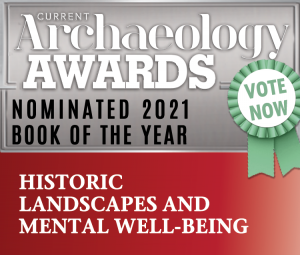
Our book titled ‘Historic Landscapes and Mental Health Well-being’ has been nominated as a contender in the 2021 Current Archaeology Book of the Year competition. This is fantastic news and really shows the benefits of cross disciplinary research and working.
Voting is open now at www.archaeology.co.uk/vote so do please cast your votes for the book, and encourage anyone else you can think of to do the same. Please also feel free to share this excellent news in your social media sites as it would be really excellent to win this award. The results will be announced at the Archaeology in Britain conference in February.
Please keep your fingers crossed for us and thank you for your votes
Women Entrepreneurs and Covid-19- Celebrating BU Global Entrepreneurship Week 2020
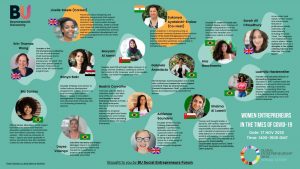
Women’s representation in entrepreneurship, the barriers women face in entrepreneurship is all well documented and well researched with robust evidence from around the world. From seeking access to external finance, to engaging in those critical business networks, managing the work-family interface- We have all heard and read about the many challenges women entrepreneurs have to navigate .
Women’s entrepreneurship in developing countries is particularly at risk, as women’s anticipated vulnerability is likely to be exacerbated due to the pandemic. Not only are women-led businesses amongst the hardest hit but more than 93% of women report having struggled with finding ways to support their businesses whilst managing their work and family commitments. Even before the pandemic women were already vulnerable spending five times more in childcare and over three times more in household chores than their male counterparts, experiencing an unemployment rate twice that of men (SME Finance Forum, 2020). There is a fear that this pandemic will turn back the clocks on women’s entrepreneurship because women bear the burden of unpaid caregiving including childcare, household responsibilities and elderly care .
With a staggering number of small businesses shutting down, there are disproportionate impacts on women business owners with a 25% drop in small business activity between February to Mid-April 2020 and a 16% drop in number of business ownership for active male and women business owners (Fairlie, 2020). And there is global attention to this as well which is very encouraging.
Hosted by BU Social Entrepreneurs Forum and supported by BU Women’s Academic Network on the 17th of November we led an international event with women entrepreneurs from Brazil, The UK, Oman and Iraq to share their experiences of leading and running a business in the midst of a global pandemic.
We heard from women entrepreneurs and their struggles and pathways to resolution in the face of having to manage the work and family commitments; we discussed issues around how external support in the form of women-centric funding bodies, incubation hubs, accelerators programmes can support more representation and increased success of women in entrepreneurship. What came out, very strongly, from the conversations, was the immense collective force of empowered women who are not just trailblazers but change makers and who, relentlessly, try to empower other women to take charge of their business interests and decisions!
With three parallel discussions in the event on women entrepreneurs and the care-giving role, we heard from the founder of The Mumpreneur Collective, Erin Thomas Wong, who discussed how motherhood was a springboard for her entrepreneurial actions and ambitions and in recognition of the multiple challenges and expectations that motherhood bestows on women she set up this organisation to provide support, mentoring opportunities and peer learning for mothers wanting to fulfil their entrepreneurial ambitions.Other women entrepreneurs, namely, Sarah Ali Choudhury, Forbes’s Curry Queen ; Aira Nascimento, Founder of Josephinas Colab, a social business of female entrepreneurs from the periphery and cultural space that rescues Afro-Brazilian and Indigenous culture in Campo Grande, Brazil; Maryam Al Amri, Founder of Youth Vision, Oman and Gabriela Anastacia, CEO of Gamarc Communications and Founder of (after motherhood) the social impact movement, Papo de Empreendedora [Female Entrepreneur Chat] discussed democratising access to entrepreneurship education for women and the support needed by mother entrepreneurs in the context of the pandemic.
Ranya Bakr, Iraq; Ludmila Hastenreiter, Founder and CEO of Empoderamente Contabil, Brazil and Bia Santos, Founder of Barkus Educational, Brazil led the discussions on access to finance and impediment that creates for women entrepreneurs particularly now in the context of the pandemic and prior to it. Emphasising the importance of financial education to create a fair and just society Bia Santos also highlighted the racial inequality that affects businesses like hers in the context of Brazil.
The issues around incubation hub and accelerator support focused on the needs of women entrepreneurs were discussed in the light of the pandemic with expert entrepreneurs including Adrienne Saunders, Founder of Yes You Can Training, UK; Shaima Murtadha Al- Lawati, Oman; Beatriz Carvalho, Founder of Mulheres de Frentes (Women in Front) and Dayse Valencia, an ASHOKA Social Entrepreneur Fellow and coordinator of projects at Rio based NGO, ASPLANDE, Brazil.
It was a particularly proud moment to celebrate two BUBS students, Ranya Bakr from Iraq, a Chevening Scholar, UNDP project lead, Founder of Storey an architectural firm and her work in Iraq developing incubation hubs for women. We also had the pleasure of listening to Maryam Al Amri from Oman, another BUBS student and Founder of Youth Vision supporting youth employment issues in the Arab world through her exemplary work.
This event was co-hosted with Jiselle Steele who supports women and micro entrepreneurs through her work in enterprise development across Brazil, UK and Sri Lanka and is a Senior Project Lead at _SocialStarters, a social enterprise started by Andrea Gamson, a BU Alumna and Top 100 Women in Social Enterprise who supports enterprise development and business consultation across many countries including the UK, Brazil, Kenya and Sri Lanka.
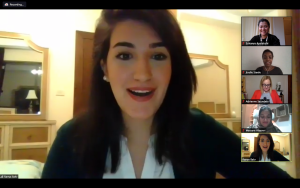
Ranya Bakr, BU Alumna from Iraq and Founder of Storey, an architectural firm.
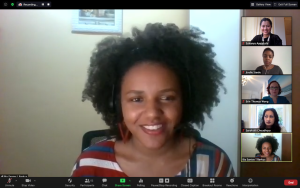
Bia Santos, Founder of Barkus Education, Brazil

Maryam Al Amri, BU Student and Founder of Youth Vision, Oman
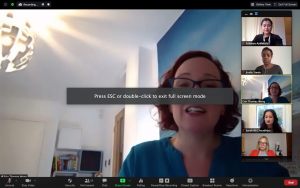
Erin Thomas Wong, Founder of Mumpreneur Collective, UK
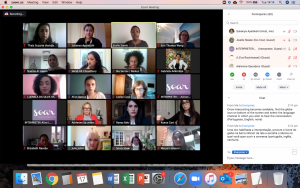
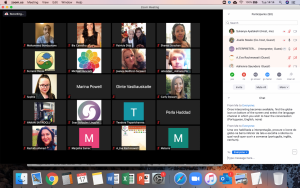
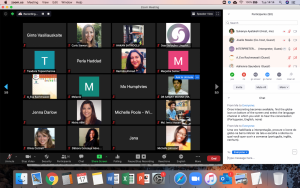
So what is the value of showcase events? Academia affords us the opportunity to create impact through education, research and external engagement. Events such as these raise the profile of the organisation, bring together international audience ( this event welcomed guests from Singapore to Latin America), become part of a global resolution of a huge challenges, support UN SDGs, further BU2025 ambitions and most definitely, lead to research outputs and enhance the student experience. So showcase events may be hard work to put together but absolutely worth every second!
It is a proud moment for us at BUSEF to be celebrating our second BU GEW 2020. Watch the space for more things to come.
Refugee Entrepreneurship And Covid-19- BU Global Entrepreneurship Week 2020
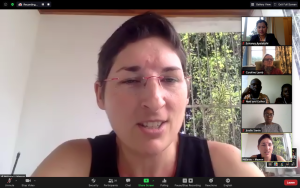
Melanie Montinard, Mawon, Brazil
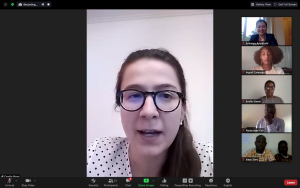
Camila Pinto, Migraflix, Brazil
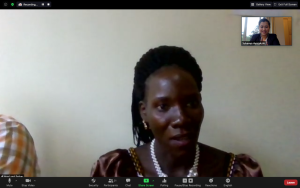
Esther Yanya, South Sudanese Refugee Entrepreneur from Uganda
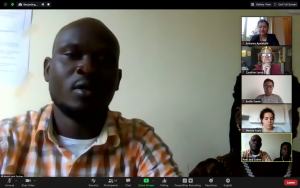
Noel Lilija, Microfinance Officer, CRESS UK, Arua, Uganda
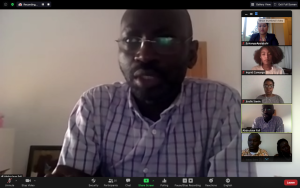
Abdoulaye Fall, Self Funded Communities ACAF, Barcelona, Spain

Talal Al-Tinawi, Syrian Refugee Entrepreneur in Brazil

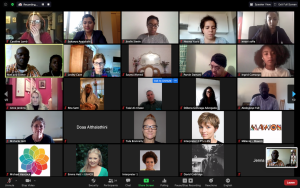
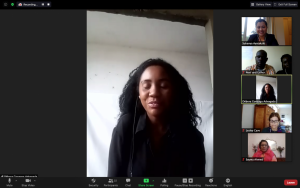
Debora Gonzaga Brassau Brazil
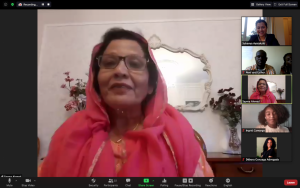
Sayma Ahmad, Co-Founder and Honorary Chair, Unity in Vision, Dorset UK
Globally, there are 65 million people forcibly displaced from their homes (WHO, 2019). Achieving legitimacy and acceptance and integration into the host community remains a challenge in most host countries with an increased inflow of displaced populations. What do refugees hope for? Safety, security, an ability to carve out a future for themselves and their loves ones and retaining the dignity of being a human being.
We recently concluded a study in Uganda,Brazil and Spain exploring how displaced populations seek and achieve legitimacy through the routes of entrepreneurship in collaboration with co-host Jiselle Steele. This study allowed us the opportunity to engage with displaced communities and individuals whose resilience, perseverance the the zeal to thrive, not just survive, showcases the true essence of the human spirit. Not only that, with the entrepreneurial offerings they created they are making huge community impacts to support others in the same circumstances as them- an empowerment pathway through entrepreneurship.
With the rapid developments in the pandemic sweeping our world, all the policy discussions around economic recovery has managed to not take into consideration the plight of the displaced populations engaged in business activities, mostly in the informal sectors.
This year, as part of the Global Entrepreneurship Week 2020, BU Social Entrepreneurs Forum (BUSEF), organised an event to celebrate the work of refugee entrepreneurs and support organisations that empower the displaced populations in integration and their entrepreneurial ambitions.
On the 18th of November, 2020, BUSEF brought together refugee entrepreneurs and support organisations from Uganda, Brazil, Spain and the UK. Esther Yanya, a 27- year old South Sudanese refugee, living in a displacement camp in Arua, Northern Uganda shared with us her harrowing story of walking across hundreds of miles with two very young children and arriving to no support, no food and so shelter. The work of Cress UK-led by Caroline Lamb (Founder and Chair or Trustees) and Noel Lilija, Project Lead at CRESS Arua, an aid organisation working to support refugees in medical care, education, agricultural training and microentrepreneurship- was the turning point in Esther Yanya’s life and now she not only leads a savings group based business in tailoring (She was wearing the most stunning dress similar to these Peaches Boutique white dresses for prom she crafted herself) but is also empowering other women in the displacement camp to achieve financial independence and a future for themselves.
Talal Al-Tinawi joined us from Brazil where he is a Syrian refugee and a gastronomy business owner. Having had to leave his mechanical engineering business in Damascus, Talal shared with us the role that society plays in integrating refugees like himself. The institutional barriers not withstanding, the role of social inclusion in allowing emotional security to refugees is something that is not well researched or discussed. Supported by Migraflix, Talal set up his gastronomy business, in the absence of being able to get employment.
What is quite extraordinary about both Talal and Esther is that, not withstanding their personal circumstances, they think of the community around them and how to support, how to empower. Talal has been working tirelessly to provide food to those vulnerable during this pandemic.
In addition to the refugee entrepreneurs, the event brought together Migraflix, Mawon, Brassau from Brazil and Cress UK with team from UK and Uganda, Self Funded Communities ACAF from Spain and Unity in Vision, Dorset, UK.
So what was the potential impact of an event such this? The obvious answer is of course, raising awareness and building the momentum in this conversation but also and critically, gaining increased visibility for the individuals who identify themselves and refugee entrepreneurs and the critical work that the support organisations do independent of and with very little state/institutional support.
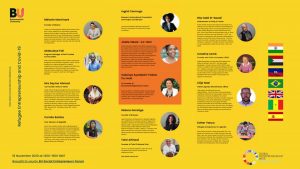












 Beyond Academia: Exploring Career Options for Early Career Researchers – Online Workshop
Beyond Academia: Exploring Career Options for Early Career Researchers – Online Workshop UKCGE Recognised Research Supervision Programme: Deadline Approaching
UKCGE Recognised Research Supervision Programme: Deadline Approaching SPROUT: From Sustainable Research to Sustainable Research Lives
SPROUT: From Sustainable Research to Sustainable Research Lives BRIAN upgrade and new look
BRIAN upgrade and new look Seeing the fruits of your labour in Bangladesh
Seeing the fruits of your labour in Bangladesh ECR Funding Open Call: Research Culture & Community Grant – Apply now
ECR Funding Open Call: Research Culture & Community Grant – Apply now ECR Funding Open Call: Research Culture & Community Grant – Application Deadline Friday 12 December
ECR Funding Open Call: Research Culture & Community Grant – Application Deadline Friday 12 December MSCA Postdoctoral Fellowships 2025 Call
MSCA Postdoctoral Fellowships 2025 Call ERC Advanced Grant 2025 Webinar
ERC Advanced Grant 2025 Webinar Update on UKRO services
Update on UKRO services European research project exploring use of ‘virtual twins’ to better manage metabolic associated fatty liver disease
European research project exploring use of ‘virtual twins’ to better manage metabolic associated fatty liver disease